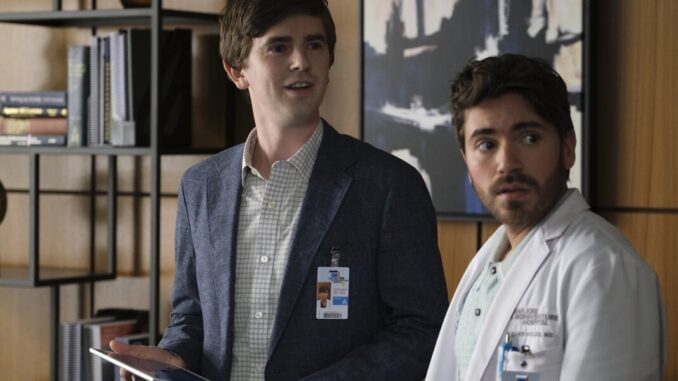
In the eighth episode of The Good Doctor Season 6, titled “Sorry, Not Sorry,” the show peels back the emotional layers of accountability, trauma, and forgiveness within the high-pressure world of medicine. This episode, written by Sam Chanse and Tracy Taylor and directed by Bosede Williams, doesn’t just deliver surgical drama — it dares to ask the uncomfortable questions that arise when doing the right thing doesn’t feel right at all.
The episode’s title speaks volumes. “Sorry, Not Sorry” could easily describe multiple threads running through the hour. The core of the story revolves around Dr. Shaun Murphy (Freddie Highmore), still grappling with the fallout from his decision to perform life-saving surgery on Dr. Audrey Lim (Christina Chang) — a decision that saved her life but left her paralyzed. The episode opens with Lim cautiously navigating the physical and emotional hurdles that remain months later, while Shaun attempts to reestablish a professional relationship. It’s awkward. It’s tense. And it’s beautifully honest.
Their pivotal scene — a quiet conversation in Lim’s office — becomes one of the most emotionally charged moments in the series to date. Shaun doesn’t apologize for the surgical call; instead, he apologizes for the pain it caused. Lim, guarded but clearly moved, tells him that she doesn’t regret being alive, but it doesn’t erase the hurt. It’s not a traditional reconciliation, but a raw, nuanced exchange between two people trying to make sense of a relationship shattered by a necessary act.

While Shaun and Lim navigate emotional debris, the rest of the team faces ethical dilemmas of their own. One of the central medical cases this week involves a patient suffering from a dangerous infection after a surgical sponge was left inside her body during a previous operation. Shaun, Dr. Aaron Glassman (Richard Schiff), and Dr. Asher Wolke (Noah Galvin) must correct the mistake, confronting the very human reality that even good doctors make terrible errors. It’s a quiet reminder that medicine, as much as it is a science, is often a gamble with impossibly high stakes.
This story becomes a character study for Asher as he finds himself stepping up in a tense operating room while also being emotionally available outside of it. His calm under pressure and evolving empathy add dimension to a character who continues to grow in confidence and compassion.
Then comes Dr. Morgan Reznick (Fiona Gubelmann), who takes center stage with a case that hits painfully close to home. Her patient, a young woman, has been sexually assaulted, and Morgan is tasked not only with treating the physical aftermath but offering emotional support. As the layers of the case unfold, Morgan is visibly shaken, suggesting her own unresolved trauma. In a delicate, well-acted arc, she channels that emotion into advocacy, ensuring the patient feels heard, seen, and empowered. Morgan, known for her often abrasive demeanor, shows deep compassion, proving once again that empathy doesn’t have to be loud — it can be quiet, steady, and strong.
